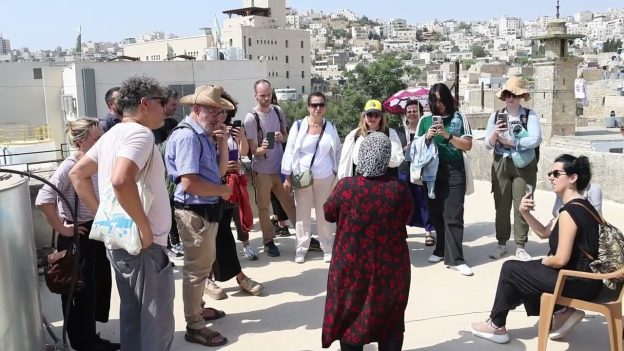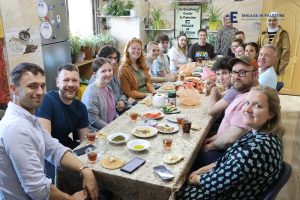Infrastructure in the West Bank, Palestine: Those considering traveling to the West Bank, Palestine for any considerable amount of time may have some anxieties about the logistics surrounding daily life. How does transportation work? Which bus or taxi should you take to get to your destination? Will your phone work upon arrival should you need to make a call or use a translation device? Do establishments and homes have internet available? What type of electrical plugs do I need and is there always electricity? Is the water safe to drink?
For those unfamiliar with Palestinian daily life, it may be surprising to encounter modern buildings, LED advertisement billboards, brand new cars driving past, and teenagers with the latest smartphone technology. Though Palestine has an eventful history, a politically tumultuous present, and various contrasts with the West, it will be reassuring to know Palestine’s infrastructure is not all that different from the infrastructure our international visitors are accustomed to in their home countries.
Below is a description we hope you find reassuring to the ins and outs of Palestine from a logistical standpoint.
Table of Contents
Roads
Roads in the West Bank, Palestine are generally very busy and may not be well-surfaced or maintained. Additionally, road safety, street design, and traffic management is not as discernible as the typical street found in the West; there are far fewer street lights and traffic signs, and roads going in one direction may have one or two lanes depending on the situation, i.e., whether two cars can fit or not. Road regulations and logistics are therefore often ambiguous, and thus driving habits are rather casual.
Additionally, sidewalks tend not to be consistent and are used more by patrons browsing local shops rather than for the express purpose of arriving at your destination by walking. This, combined with relaxed traffic regulations, often means the typical urban street is a thoroughfare for vehicles and pedestrians alike.
While crosswalks exist, they are not commonly utilized, and crossing the street is just as ambiguous as driving. More often than not, pedestrians will simply wait for a slight break in traffic to cross, or use the rush hour traffic jams to their advantage.
Transit
Taxis
In Hebron, West Bank taxis are a popular mode of transport as they are cheap and plentiful. Generally speaking, taxi services are divided between private and shared. The smaller, private taxis may and are still customarily shared while making point-to-point journeys, with drivers picking up and dropping off passengers en route. Additionally, these private taxis are ideal for shorter trips within an urban area and should cost no more than a few shekels. Private taxis are also available direct from your door to your destination, however, they will cost relatively more.
Shared taxis are larger than their smaller, private counterparts, and are ideal for longer journeys to other cities within Palestine. About the same size as a typical mini-van, shared taxis can be found outside high-traffic areas, popular tourist attractions, and bus stations, and are especially prominent at crossing points such as in Jerusalem and Jericho. The fee for these taxis is quite economical considering the distance they cover, though keep in mind they typically do not depart until all the seats have passengers.
You should also note that taxis are differentiated by their body color as well; Palestinian taxis are yellow with white plates while Israeli taxis are white with yellow plates. If you do decide to take a taxi, make sure it’s yellow to avoid any potential issues entering Hebron, as the taxi driver can decline your request.
Buses
In addition to the network of taxis, transport by bus is also commonly utilized to travel between cities throughout Palestine. While a bus will not always cover the entire distance to the next city, they are competitively priced, making it an economical alternative for the frugal traveler. Depending on your departure point, buses may be listed in Arabic, Hebrew, or English, especially when traveling from Jerusalem or other popular tourist centers.
There is no direct bus route from Jerusalem to Hebron, the nearest bus destination being Bethlehem; between Bethlehem and Hebron, a shared taxi will be the next mode of transport. The same also applies to those using the King Hussein/Allenby Bridge Crossing from Jordan; once past Israeli border control, a bus to Jericho will be available, and from Jericho, a mass of shared taxis will be in high supply.
Communication
Mobile Phone Service
Despite the increased difficulty of importing goods, Palestine has access to all the latest smartphone technology, the same as you would find in any country. While Israel withheld phone frequencies and suppressed 3G networks for over a decade, as of 2018 Palestine has access to 3G and may soon expand into 4G technology as well.
Before your departure to Palestine, it would be prudent to research international plans offered by your carrier; if their price and quality are satisfactory, purchasing the plan ahead of time for the duration of your stay ensures you mobile access from the very beginning.
Another option is to wait until your arrival to set up mobile access, however, you should ensure your device is unlocked and SIM-card compatible before exploring this option. Additionally, there are some extra factors due to the political landscape. Essentially you have two options: purchase a SIM card in the airport after landing or wait until you arrive in Hebron. SIM cards purchased at the airport use Israeli networks, while those purchased within the West Bank use Palestinian networks. Palestine itself has two network operators: Jawwal, which is a homegrown, Palestinian communications company, and Ooredoo, a Qatari company operating within Palestine.
A third option is to purchase an eSIM–a virtual SIM card–which works the same as physical SIM cards without all the hassle. ESIMs are especially helpful for those traveling to multiple countries in succession or those with short-term travel plans; for instance, the international plans described above may have a minimum term commitment of a month or two, whereas eSIMs offer both weekly and monthly plans with various data and price options. When considering eSIMs, though, it’s important to check your specific device and model are supported by the eSIM developer, and that eSIMs are available in your destination country.
After all is said and done, upon arrival at the Ben Gurion International Airport, you should receive a text message from your carrier detailing the specifics of your plan; depending on your carrier, you may receive an additional text message once you cross into the West Bank. For those with eSIMs, you can disregard these messages since your SIM card will be activated for the local networks.
Internet
About 80 percent of Palestinians have home internet, so it’s more than likely you’ll be able to use your devices and save your mobile data while at home. Keep in mind, when adjusted for the West Bank specifically, there is a 16 percent chance you will be without internet during your homestay.
Either way, though, Engage in Palestine has two routers to cover the length of our office; you will always have internet access while working at the Center. Additionally, Wi-Fi is available at most establishments, including cafes and restaurants, and you will often find students of local schools here working on their laptops.
Electricity, Water, and Heating
In regards to electricity, Palestine uses the European-style two- and three-pin round type C and H plug sockets. Additionally, the standard supply voltage in Palestine is 230V with a frequency of 50Hz. While everyone should research their country’s electrical specifics before arrival to ensure compatibility, most international travelers will likely need a plug adapter and voltage converter designed specifically for their country and Palestine. Fair warning to travelers, electricity can be unstable, and intermittent power cuts are not uncommon.
Like electricity in Palestine, the water supply also experiences occasional disruptions, and you may find hot water is not always available. Additionally, while Palestinians are accustomed to drinking tap water, foreigners are advised against this; most of Palestine’s water is sourced from groundwater, which is susceptible to higher rates of pollution.
Finally, unlike Western homes which are built using insulated materials to guard against hot and cold temperatures, Palestinian homes are almost exclusively built using cement. Buildings in Palestine also lack central heating, though depending on your home situation you may have access to a small space heater. In either case, regardless of the season in which you visit, it’s advisable to pack warm clothing to be worn at home.
Past and Present Collide
Palestine, as you will see while in Hebron, is a place of many contrasts. There are buildings dilapidated and derelict, vendors commonly transport their vegetables to market via horse-drawn carts, and you may see models of cars that have long disappeared from the streets of Europe.
Overall, though, Palestinian cities play host to a bustling, urban lifestyle, one that features most of the modern fixtures found anywhere else. Bright yellow taxis zip in and out of the streets, people line up for delicious street food, women shop for home essentials and fashionable clothes, and students work on their assignments in coffee shops as they pursue their education.
Palestine itself is full of life, and it’s this mix of past and present that completes it.
Any questions
Should you have any questions, please do not hesitate to contact us at Info@ecpalestine.org
Whatsapp:+972599479880
For more information, please visit our website: https://ecpalestine.org/
Excellence Center’s Facebook page: https://www.facebook.com/ExcellenceCenter
Excellence Center’s Facebook account: https://www.facebook.com/RafatECHebron
Watch us on Youtube: https://www.youtube.com/channel/UCsQSLdFZWZcBm6Uj0XMYuKg
Visit and Explore Palestine: https://www.facebook.com/ExplorePalestine
Tags: Infrastructure in the West Bank, Internet in the West Bank, Sim card in Palestine



